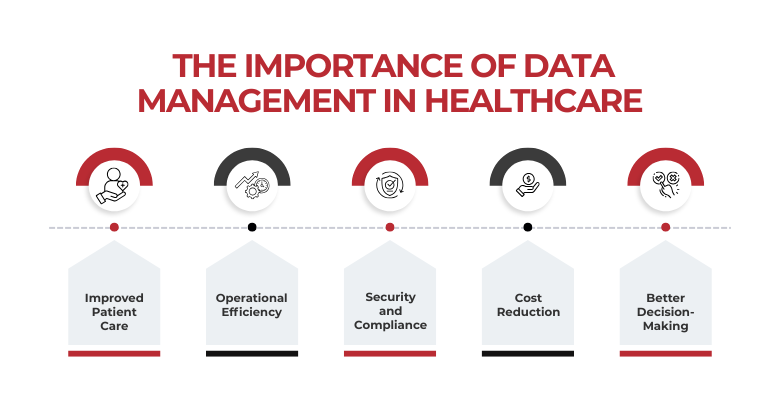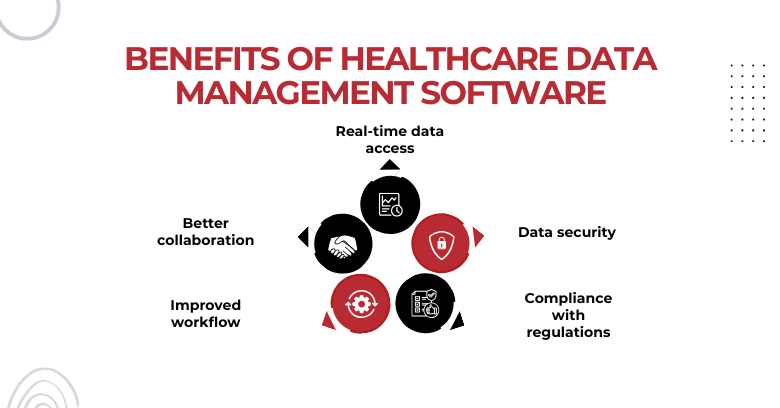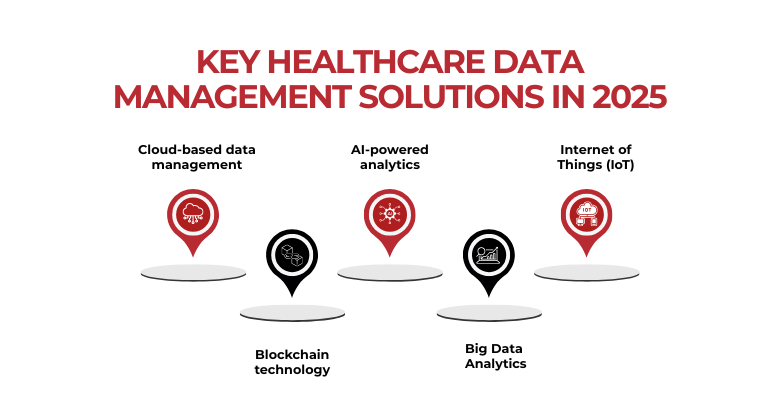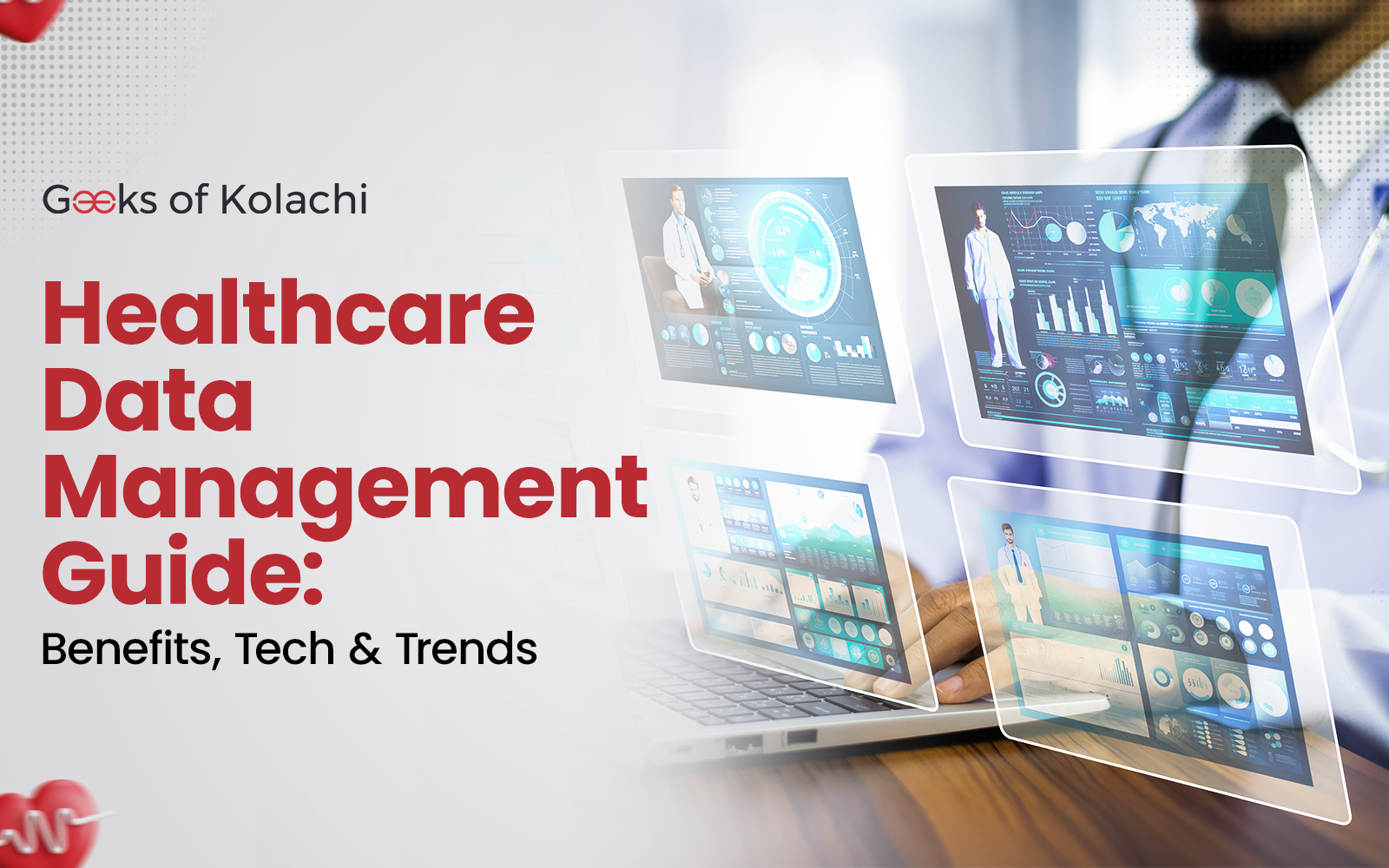As the healthcare industry continues to evolve, managing healthcare data effectively becomes more critical than ever. With advancements in technology, healthcare organizations are seeing massive growth in the amount of data they generate and store. In this digital age, effective healthcare data management is essential not only for improving patient care but also for ensuring operational efficiency, security, and regulatory compliance. As we approach 2025, the need for more sophisticated data management in healthcare systems is becoming more apparent.
Healthcare data management is transforming the way patient information is stored, accessed, and analyzed. With the rise of technologies like artificial intelligence (AI), cloud computing, and blockchain, the tools and strategies used to manage healthcare data are more advanced and robust than ever before. This guide will walk you through the importance of healthcare data management, its evolution, the solutions available today, and the future of healthcare data management systems.
Table of Contents
ToggleWhat is Healthcare Data Management?
Healthcare data management refers to the systematic process of collecting, organizing, securing, and analyzing healthcare data. This data includes everything from electronic medical records (EMRs), electronic health records (EHRs), and patient data management systems to medical images, lab results, and billing information. The goal of healthcare data management is to ensure that this vast amount of information is both accessible and secure, and that it is used effectively to improve patient outcomes, streamline operations, and maintain regulatory compliance.
As more healthcare organizations embrace digital solutions, the role of healthcare data management software becomes even more crucial. These systems help organizations process large volumes of data and enable healthcare professionals to access up-to-date patient records quickly and securely. The rise of cloud storage and AI also means that healthcare providers can manage data more efficiently, and make better decisions based on the insights gathered from the data.
The Importance of Data Management in Healthcare
The importance of data management in healthcare cannot be overstated. Healthcare organizations are tasked with managing an ever-increasing volume of sensitive patient data, and improper handling can lead to major issues, including errors in patient care, security breaches, and non-compliance with regulations.

Here are a few reasons why data management for healthcare is essential:
- Improved Patient Care: Accurate and timely data access is key to delivering high-quality care. When healthcare providers have access to the most current patient information, they can make better decisions regarding diagnosis, treatment, and follow-up care.
- Operational Efficiency: By digitizing patient records and automating administrative tasks like scheduling and billing, healthcare organizations can reduce operational costs and increase efficiency. Healthcare data management solutions help reduce redundancy in treatments and streamline workflows.
- Security and Compliance: As healthcare data is highly sensitive, ensuring its security is crucial. Proper data management practices help healthcare organizations stay compliant with regulations like HIPAA (Health Insurance Portability and Accountability Act), safeguarding patient privacy and preventing data breaches.
- Cost Reduction: Effective data management can help identify inefficiencies and waste, enabling healthcare organizations to reduce costs. For example, eliminating redundant tests or procedures can save money, while improved billing processes can reduce administrative overhead.
- Better Decision-Making: Healthcare professionals can make better clinical decisions when they have real-time access to comprehensive patient data. This improves outcomes for patients and enhances overall organizational decision-making.
The Evolution of Healthcare Data Management Systems
The concept of healthcare management has evolved significantly over the years. Initially, healthcare organizations relied on paper-based systems to manage patient data, which was cumbersome, inefficient, and prone to errors. Over time, this shifted to electronic medical records (EMRs) and electronic health records (EHRs), which allowed for quicker access to patient information and improved communication between healthcare providers.
In recent years, the advent of cloud-based solutions and AI-powered tools has completely transformed healthcare data. Cloud computing allows healthcare organizations to store large volumes of data securely, while AI helps analyze that data to extract meaningful insights. With the rise of healthcare database management, the ability to share and integrate data across multiple systems and providers has also become a reality, enhancing collaboration and care coordination.
Looking ahead to 2025, healthcare data management systems will continue to become more advanced and integrated, leveraging emerging technologies like blockchain, Internet of Things (IoT), and big data analytics to further enhance the management of healthcare data.
Healthcare Data Management Software: A Game-Changer
The backbone of modern health information management systems is the software. These platforms enable healthcare providers to efficiently manage large volumes of data, including patient health records, test results, medical imaging, and more. By centralizing data in one platform, healthcare management software ensures that healthcare professionals can access the most accurate, up-to-date information in real-time.

Some of the key benefits of using this software include:
- Real-time data access: Healthcare professionals can access patient records instantly, reducing delays in diagnosis and treatment.
- Data security: These platforms come with built-in security features, ensuring that patient data is protected from unauthorized access and breaches.
- Compliance with regulations: Many healthcare data management systems are designed to comply with regulations like HIPAA, ensuring that patient data is handled appropriately.
- Improved workflow: By automating administrative tasks like appointment scheduling, billing, and patient intake, healthcare providers can streamline operations and reduce costs.
- Better collaboration: Data sharing between healthcare providers becomes easier, improving communication and care coordination.
In 2025, data management healthcare will continue to evolve, offering even more advanced features like predictive analytics, AI-powered decision support, and enhanced data integration.
Key Healthcare Data Management Solutions in 2025
As healthcare data continues to grow in volume and complexity, healthcare organizations will rely more heavily on advanced healthcare data management solutions. Some of the key solutions that are expected to play a significant role in 2025 include:

- Cloud-based data management: Cloud storage solutions offer scalability, cost-effectiveness, and security, making them a preferred option for storing healthcare data. By leveraging the cloud, healthcare organizations can store vast amounts of data without the need for expensive physical infrastructure.
- AI-powered analytics: Artificial intelligence will play a crucial role in improving data management healthcare. By analyzing large datasets, AI can provide actionable insights, predict patient outcomes, and automate routine tasks.
- Blockchain technology: Blockchain provides a secure, decentralized way to store and share healthcare data. Its transparent and immutable nature makes it ideal for addressing concerns around data security and privacy in healthcare.
- Internet of Things (IoT): IoT devices, such as wearable health monitors and remote monitoring tools, will generate massive amounts of data in real time. Healthcare data systems will need to integrate these data sources to create a comprehensive view of a patient’s health status.
- Big Data Analytics: As healthcare organizations collect more data, they will need advanced analytics tools to process and make sense of that data. Big data analytics can help identify patterns, predict health trends, and improve clinical decision-making.
AI in Healthcare Data Management: Transforming Patient Care
One of the most exciting advancements in health data management is the integration of AI. AI has the potential to completely transform the way healthcare organizations manage data and deliver care. Here’s how AI can make a difference:
- Predictive analytics: AI algorithms can analyze patient data to identify patterns and predict health trends. For example, AI can predict which patients are at risk for developing chronic conditions like diabetes or hypertension, allowing for earlier intervention.
- Improving diagnosis: AI-powered systems can analyze medical data—such as images, lab results, and patient histories—to assist healthcare providers in diagnosing conditions more accurately.
- Personalized treatment plans: AI can help healthcare providers develop customized treatment plans for patients based on their unique data, improving patient outcomes.
- Automating administrative tasks: AI can automate routine tasks like scheduling, billing, and data entry, freeing up healthcare professionals to focus on patient care.
Patient Data Management: Ensuring Efficiency and Accuracy
Patient data management is a critical aspect of medical data management. Healthcare providers must ensure that patient data is accurate, up-to-date, and easily accessible. This involves integrating data from various sources, including medical records, lab results, wearable devices, and remote monitoring.
In 2025, data management systems will become even more efficient at managing this data, with seamless integration across platforms and real-time updates. This will enable healthcare providers to deliver more personalized and efficient care, reducing errors and improving patient outcomes.
The Role of Healthcare Data Management Systems in 2025
In 2025, these health information and management systems will play an even more critical role in delivering high-quality care and improving operational efficiency. These systems will be fully integrated with other healthcare technologies, such as AI, wearable devices, and telemedicine platforms, creating a seamless ecosystem for managing patient data.
By 2025, data quality management in healthcare will allow healthcare providers to:
- Access real-time patient data from various sources, including remote monitoring devices and wearables.
- Predict patient outcomes using AI-powered analytics.
- Collaborate more effectively with other healthcare providers by sharing patient data securely and seamlessly.
- Automate administrative tasks to reduce operational costs and improve efficiency.
Overcoming Challenges in Healthcare Data Management
Despite the benefits of data management in healthcare, there are several challenges that healthcare organizations must address:
- Data fragmentation: Healthcare data is often stored in different systems and formats, making it difficult to consolidate and analyze.
- Data security: The rise of cyberattacks and data breaches has made protecting sensitive healthcare data a major concern.
- Regulatory compliance: Healthcare organizations must comply with strict regulations like HIPAA, which govern how patient data is handled and shared.
To overcome these challenges, healthcare organizations need to invest in healthcare data management solutions that offer enhanced security features, interoperability, and real-time data access.
Conclusion
As we approach 2025, the need for effective healthcare data management has never been greater. With the rapid advancements in technology, healthcare organizations must leverage healthcare data software and solutions to improve patient care, streamline operations, and ensure compliance. By integrating AI, blockchain, and other emerging technologies, healthcare organizations can better manage the growing volume of healthcare data and make more informed decisions.
We specialize in providing cutting-edge healthcare solutions that help healthcare organizations stay ahead of the curve. Contact us today to learn how our healthcare data management systems can enhance your healthcare organization’s efficiency and improve patient outcomes.
Frequently Asked Questions
1. What is Healthcare Data Management?
Healthcare Data Management refers to the process of collecting, organizing, securing, and analyzing health data, including patient records and treatment information. This ensures that healthcare organizations can provide accurate, timely care and comply with necessary regulations, improving both patient outcomes and operational efficiency.
2. Why is Healthcare Data Management Important?
Effective Healthcare Data Management helps healthcare providers create comprehensive patient profiles, predict health trends, and make informed decisions. It improves patient care, ensures compliance with healthcare regulations, and streamlines operations by reducing errors and costs.
3. What are the Key Benefits of Healthcare Data Management?
Healthcare Data Management enhances patient care by providing accurate and accessible data, improves operational efficiency through automation, ensures compliance with regulatory standards, and strengthens data security to protect sensitive patient information.
4. What Challenges Exist in Healthcare Data Management?
Healthcare organizations face challenges like fragmented data across different systems, data quality issues, and the ongoing need to comply with evolving regulations. Additionally, cybersecurity threats remain a constant concern, requiring strong protective measures for sensitive patient information.
5. How Can Healthcare Organizations Improve Data Management?
Healthcare organizations can improve Healthcare Data Management by integrating data across systems, establishing data governance policies for accuracy and security, training staff on best practices, and utilizing AI and analytics to gain actionable insights and streamline workflows.
